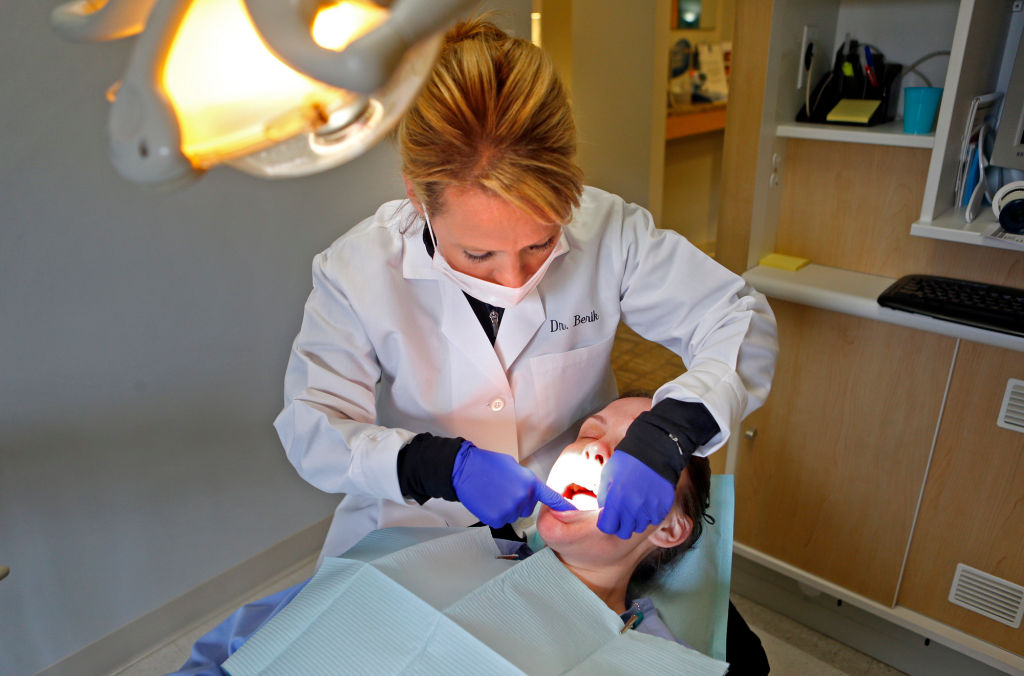Private Equity Delivers Consistently Poor Health Outcomes
Emergency rooms, dentist offices, and nursing homes managed by the private equity industry consistently deliver worse health outcomes than other such medical institutions. The difference can mean life or death for patients.

From emergency rooms to the dentists’ office, research shows that private equity–managed health care performs poorly — often with deadly consequences. (Nancy Lane / MediaNews Group / Boston Herald via Getty Images)
Private equity, the scantly regulated high-risk industry best known for burying companies in debt and liquidating them for parts, wants to manage your health care — even if it means killing you. Research shows that when private funds enter the picture, patients suffer.
Here are four ways you could die at private equity’s hands:
1
Visiting an emergency room
A new Harvard Medical School study of more than one million Medicare ER visits found that patient death rates are 13 percent higher in private equity–owned ERs than their counterparts, likely thanks to staffing and salary cuts.
On average, private equity–owned hospitals reduce hospital staffing by more than 11 percent and pay ER staffers 18 percent less than non-private equity hospitals. They also transferred patients to other hospitals more frequently and shortened their stays in intensive care units — evidence of their reduced capacity for handling “high-risk” (read: very sick) patients.
2
Going to the dentist
Corporatized dental care has long been accused of being a hotbed for medical malpractice, and matters could be getting worse as private equity sinks its talons into sprawling dental operations.
Private equity–backed dental groups have been found to perform medically unnecessary and painful procedures. One firm allegedly extracted healthy teeth from patients to charge them for expensive dental implants, while another performed root canals on the baby teeth of children as young as three.
3
Getting surgery
Across numerous surgical procedures, patients at private equity hospitals were more likely to suffer life-threatening complications and die within a month of surgery. A study of more than 662,000 Medicare hospitalizations in private equity–owned facilities saw 25 percent more hospital-acquired complications, including falls and surgical site infections, compared to other hospitals.
“Private equity acquisition of hospitals, on average, was associated with increased hospital-acquired adverse events despite a likely lower-risk pool of admitted Medicare beneficiaries, suggesting poorer quality of inpatient care,” researchers concluded.
Pregnant women may also be at higher risk in private equity–owned practices. These facilities are likely to push for C-sections because they are highly profitable, even though the procedures have an 80 percent higher chance of complications than natural birth.
And investors’ C-section market could soon be growing: In Florida, private equity backed a recently passed law that allows the procedures to be performed outside the hospital.
4
Living in a nursing home
Medicare patients in private equity–backed nursing homes suffered an 11 percent higher short-term mortality rate than those in non-private equity–backed facilities between 2004 and 2019, resulting in 22,500 additional deaths.
Nursing homes linked to private equity tend to underperform in terms of patient mobility and reported pain levels. They also tend to have fewer caregivers on staff to offer behavioral therapy, which might explain why their patients are 50 percent more likely to be prescribed antipsychotic medication.
Moreover, private equity’s liquidity issues (caused by debt-backed buyouts) mean that financial managers often sell nursing home properties and lease the facility back, spiking rent by an average of 77 percent post-buyout.